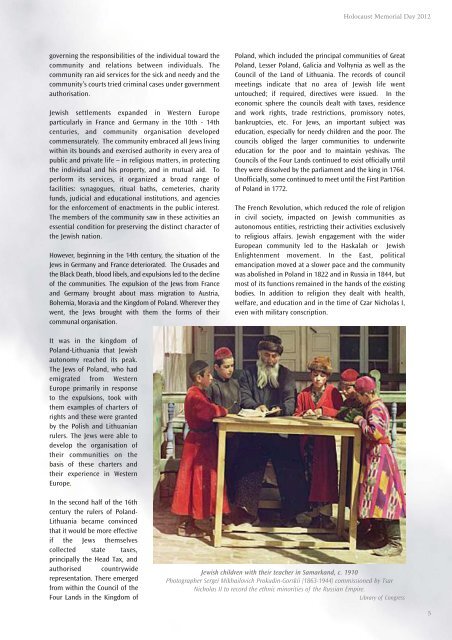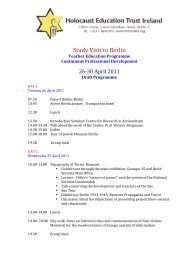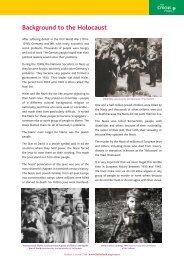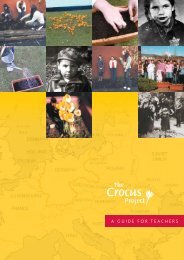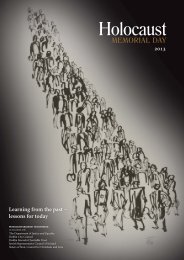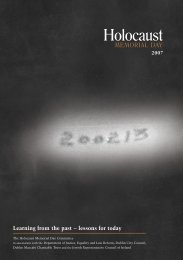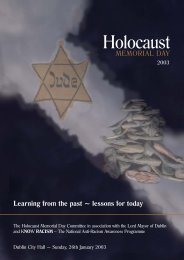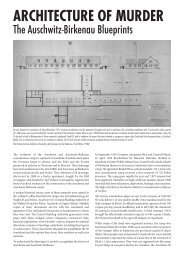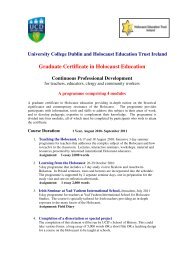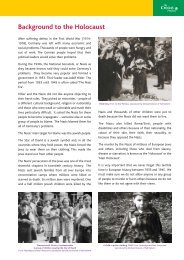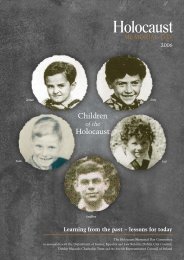Learning from the past ~ lessons for today - Holocaust Education ...
Learning from the past ~ lessons for today - Holocaust Education ...
Learning from the past ~ lessons for today - Holocaust Education ...
You also want an ePaper? Increase the reach of your titles
YUMPU automatically turns print PDFs into web optimized ePapers that Google loves.
<strong>Holocaust</strong> Memorial Day 2012<br />
governing <strong>the</strong> responsibilities of <strong>the</strong> individual toward <strong>the</strong><br />
community and relations between individuals. The<br />
community ran aid services <strong>for</strong> <strong>the</strong> sick and needy and <strong>the</strong><br />
community’s courts tried criminal cases under government<br />
authorisation.<br />
Jewish settlements expanded in Western Europe<br />
particularly in France and Germany in <strong>the</strong> 10th - 14th<br />
centuries, and community organisation developed<br />
commensurately. The community embraced all Jews living<br />
within its bounds and exercised authority in every area of<br />
public and private life – in religious matters, in protecting<br />
<strong>the</strong> individual and his property, and in mutual aid. To<br />
per<strong>for</strong>m its services, it organized a broad range of<br />
facilities: synagogues, ritual baths, cemeteries, charity<br />
funds, judicial and educational institutions, and agencies<br />
<strong>for</strong> <strong>the</strong> en<strong>for</strong>cement of enactments in <strong>the</strong> public interest.<br />
The members of <strong>the</strong> community saw in <strong>the</strong>se activities an<br />
essential condition <strong>for</strong> preserving <strong>the</strong> distinct character of<br />
<strong>the</strong> Jewish nation.<br />
However, beginning in <strong>the</strong> 14th century, <strong>the</strong> situation of <strong>the</strong><br />
Jews in Germany and France deteriorated. The Crusades and<br />
<strong>the</strong> Black Death, blood libels, and expulsions led to <strong>the</strong> decline<br />
of <strong>the</strong> communities. The expulsion of <strong>the</strong> Jews <strong>from</strong> France<br />
and Germany brought about mass migration to Austria,<br />
Bohemia, Moravia and <strong>the</strong> Kingdom of Poland. Wherever <strong>the</strong>y<br />
went, <strong>the</strong> Jews brought with <strong>the</strong>m <strong>the</strong> <strong>for</strong>ms of <strong>the</strong>ir<br />
communal organisation.<br />
Poland, which included <strong>the</strong> principal communities of Great<br />
Poland, Lesser Poland, Galicia and Volhynia as well as <strong>the</strong><br />
Council of <strong>the</strong> Land of Lithuania. The records of council<br />
meetings indicate that no area of Jewish life went<br />
untouched; if required, directives were issued. In <strong>the</strong><br />
economic sphere <strong>the</strong> councils dealt with taxes, residence<br />
and work rights, trade restrictions, promissory notes,<br />
bankruptcies, etc. For Jews, an important subject was<br />
education, especially <strong>for</strong> needy children and <strong>the</strong> poor. The<br />
councils obliged <strong>the</strong> larger communities to underwrite<br />
education <strong>for</strong> <strong>the</strong> poor and to maintain yeshivas. The<br />
Councils of <strong>the</strong> Four Lands continued to exist officially until<br />
<strong>the</strong>y were dissolved by <strong>the</strong> parliament and <strong>the</strong> king in 1764.<br />
Unofficially, some continued to meet until <strong>the</strong> First Partition<br />
of Poland in 1772.<br />
The French Revolution, which reduced <strong>the</strong> role of religion<br />
in civil society, impacted on Jewish communities as<br />
autonomous entities, restricting <strong>the</strong>ir activities exclusively<br />
to religious affairs. Jewish engagement with <strong>the</strong> wider<br />
European community led to <strong>the</strong> Haskalah or Jewish<br />
Enlightenment movement. In <strong>the</strong> East, political<br />
emancipation moved at a slower pace and <strong>the</strong> community<br />
was abolished in Poland in 1822 and in Russia in 1844, but<br />
most of its functions remained in <strong>the</strong> hands of <strong>the</strong> existing<br />
bodies. In addition to religion <strong>the</strong>y dealt with health,<br />
welfare, and education and in <strong>the</strong> time of Czar Nicholas I,<br />
even with military conscription.<br />
It was in <strong>the</strong> kingdom of<br />
Poland-Lithuania that Jewish<br />
autonomy reached its peak.<br />
The Jews of Poland, who had<br />
emigrated <strong>from</strong> Western<br />
Europe primarily in response<br />
to <strong>the</strong> expulsions, took with<br />
<strong>the</strong>m examples of charters of<br />
rights and <strong>the</strong>se were granted<br />
by <strong>the</strong> Polish and Lithuanian<br />
rulers. The Jews were able to<br />
develop <strong>the</strong> organisation of<br />
<strong>the</strong>ir communities on <strong>the</strong><br />
basis of <strong>the</strong>se charters and<br />
<strong>the</strong>ir experience in Western<br />
Europe.<br />
In <strong>the</strong> second half of <strong>the</strong> 16th<br />
century <strong>the</strong> rulers of Poland-<br />
Lithuania became convinced<br />
that it would be more effective<br />
if <strong>the</strong> Jews <strong>the</strong>mselves<br />
collected state taxes,<br />
principally <strong>the</strong> Head Tax, and<br />
authorised countrywide<br />
representation. There emerged<br />
<strong>from</strong> within <strong>the</strong> Council of <strong>the</strong><br />
Four Lands in <strong>the</strong> Kingdom of<br />
Jewish children with <strong>the</strong>ir teacher in Samarkand, c. 1910<br />
Photographer Sergei Mikhailovich Prokudin-Gorskii (1863-1944) commissioned by Tsar<br />
Nicholas II to record <strong>the</strong> ethnic minorities of <strong>the</strong> Russian Empire.<br />
Library of Congress<br />
5


